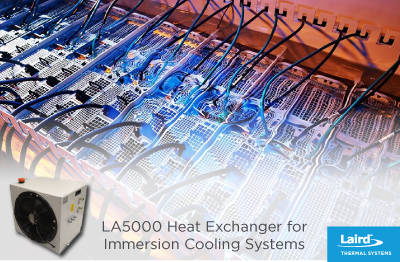LA5000 heat exchanger maximizes uptime for immersion cooling systems.
November 23, 2022 – Today, data centers housing large data files with high-traffic and fast-performing CPUs, GPUs, and servers are experiencing continued increases in capacities and support required. Increased server rack density paired with surging power flow supporting advanced server computing power and performance is resulting in an increasing amount of heat generation within data centers. Consequently, the traditional methods of air cooling are not meeting the thermal management requirements of today’s servers, CPUs, and GPUs. Immersion cooling utilizes heat exchangers to dissipate this generated heat simultaneously preventing system failures while lowering operating costs and improving energy efficiency.
Immersion cooling submerges hardware into a heat-conducting dielectric liquid that recycles drawn-out heat into a cooler liquid, expanding the processing abilities confined in smaller sizes and space. Two-phase immersion cooling involves combining the dielectric liquid with the heat generated from the submerged hardware to initiate boiling which transforms the dielectric liquid into a gas. The gas rises towards a cold-water condenser causing condensation to fall back into the immersion pool. This results in faster heat dissipation due to the phase change of the immersion fluid, and heat density. Since immersion cooling removes the need for cooling fans, this contributes to the lower power usage effectiveness rating. Electronic equipment temperature can be reduced and controlled, while also exhibiting significantly higher efficiency levels when compared to traditional air-cooled systems.
Laird Thermal Systems’ LA5000 is a 5000-watt liquid-to-air water heat exchanger designed to operate slightly above ambient temperatures serves as an excellent source of cold water for the system condenser and is ideal for immersion cooling applications. The robust design provides full-time operation, continually monitoring system liquid level, flow rate, and temperature, and alerts users of the need for preventative maintenance to avoid costly failure. The semi-closed hydraulic system contributes to the system’s increased uptime by reducing evaporative losses and preventing air from entering the liquid which could result in bio growth and cause damage to the pump.
“When it comes to high-performance and cloud computing based in smaller data centers, immersion cooling with heat exchangers relieve data center operators and managers from worrying about overheating and wasteful power consumption,” says Greg Ducharme, Product Director at Laird Thermal Systems. “Our data center heat exchangers provide a high coefficient of performance (COP) that delivers efficient, low power operation and maximizes uptime and system performance.”
Access the LA5000 datasheet or learn more about water heat exchangers at www.lairdthermal.com

